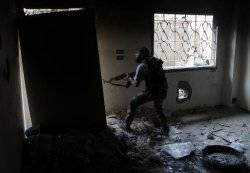Opposition forces have seized Syria's largest oilfield, cutting off President Bashar al-Assad's access to almost all local crude reserves, activists said.
The loss of the al-Omar oil field in the eastern Deir Ezzor province, if confirmed, could leave Assad's forces almost completely reliant on imported oil in their highly mechanized military campaign to put down a 32-month long uprising.
"Now, nearly all of Syria's usable oil reserves are in the hands of the Nusra Front and other Islamist units ... The regime's neck is now in Nusra's hands," Rami Abdelrahman, head of the UK-based Syrian Observatory for Human Rights, said on Saturday.
There was no immediate comment from the regime.
A video posted on the internet by activists in Deir Ezzor showed opposition forces driving a tank under a sign that read "Euphrates Oil Company - al-Omar field". The speaker in the video said the field was overrun at dawn on Saturday.
Also on Saturday, in the northern province of Aleppo, army airstrikes killed at least 44 people and wounded dozens, most of them civilians.
The deadliest of the three raids was the attack on the opposition-held town of al-Bab, where 22 people were reported killed in the strike.
Fighter jets also bombed two opposition-held districts of Aleppo, Syria's largest city. At least 15 people were reported killed in Halwaniyeh neighborhood after a strike sent bombs into a crowded vegetable market.
Seven others were reported killed in the third airstrike in the Karam el-Beik district.
Assad's forces have gained momentum against the opposition forces in recent months, partially due to support from the Lebanese Shia armed group Hezbollah and its regional ally Iran.
But opposition fighters still hold large swathes of territory in northern and eastern Syria.
Syria is not a significant oil producer and has not exported any oil since late 2011, when international sanctions took effect to raise pressure on Assad.
Prior to the sanctions, the country exported 370,000 barrels per day, mainly to Europe.
The conflict began in March 2011 as peaceful protests against four decades of Assad family rule but has degenerated into a civil war were more than 100 people are killed each day.
PHOTO CAPTION
A Syrian opposition fighter monitors the surrounding area during clashes with pro-regime forces in the northeastern city of Deir Ezzor, on October 28, 2013.
Aljazeera


 Home
Home Discover Islam
Discover Islam Quran Recitations
Quran Recitations Lectures
Lectures
 Fatwa
Fatwa Articles
Articles Fiqh
Fiqh E-Books
E-Books Boys & Girls
Boys & Girls  Hajj Rulings
Hajj Rulings Hajj Fatwas
Hajj Fatwas














